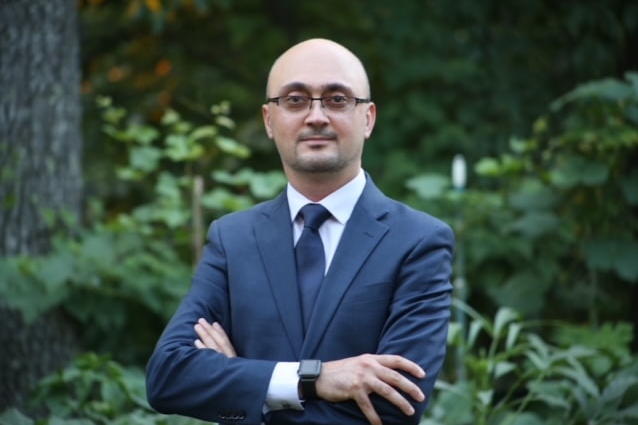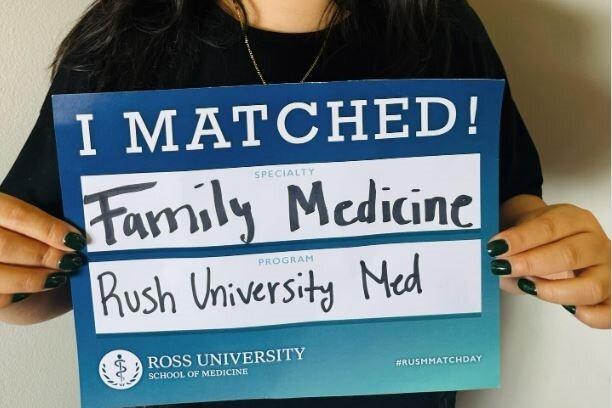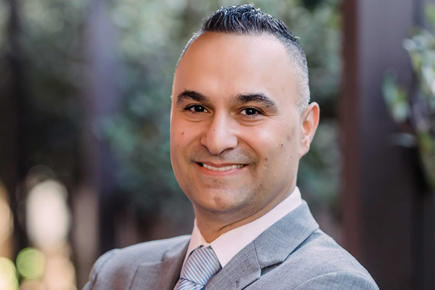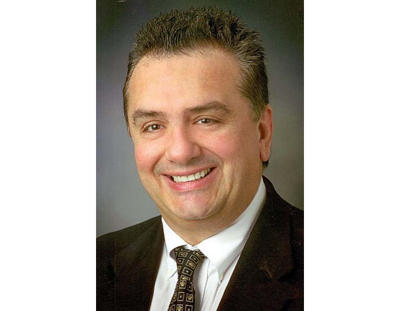Ross University School of Medicine (RUSM) alum Zaid Brifkani, MD, FASN, ’08 was determined not to let anything deter him from a medical career, even his escape from the war-torn Kurdish area of Iraq and relocation to a new country. After living through the Iran-Iraq War as a child and the first Gulf War as a teenager, his family was eventually evacuated from Iraq to Guam with 6000 other refugees, then to Virginia, and finally arrived in Nashville, Tennessee—home to America’s largest population of Kurdish Americans--and their new home.
The experience inspired Brifkani to write a fictional account of a Kurdish family escaping the Kurdish genocide that occurred in 1988, “The Mountains We Carry”. “We witnessed families disappear around us,” says Brifkani. “Experiencing this as a child, that memory stuck with me as I encountered many of the victims later in Nashville, and it inspired me to write the book.” Now being translated into several languages, he is writing a second book on the impact of war in Iraq.
Starting from scratch
Surviving war and dealing with life as a new immigrant, he resolved to reach his goal of medical school. The oldest child, he was responsible for his six siblings, and worked to help support the family. Being a refugee cost several years of his academic life, as he dealt with relocation and learning English.
Brifkani recalls what it took to get to med school. “I had to start from scratch. Both my parents were teachers, so education was always held in high regard. Despite a high GPA and good recommendation letters, I had to adjust to the different testing strategies in the U.S. However, I was resilient and determined to go to medical school.” After finishing his undergraduate degree at Middle Tennessee State University in Microbiology, he set his sights on the dream of med school. “I had the opportunity to do a year of research in a basic science cardiology lab at Vanderbilt University before getting my applications out. That put me on the path to medical school.”
Finally arriving at RUSM, he developed an interest in nephrology, the branch of medicine that deals with the physiology and diseases of the kidneys. “Throughout clinical rotations and residency training, nephrology and transplant became my favorite subjects. I learned how a transplant can dramatically change a patient’s life. In Iraq, I grew up in community where access to health care was poor. If someone had end stage renal disease, and needed a transplant, there was no hope. Part of the Muslim tradition is the belief that if you save one person’s life—you’re on the way to saving all of humanity. I wanted to honor that tradition and save lives.”
Staying focused, showing resilience
Brifkani wanted to prove he had the grit to become a doctor. “It’s a fast pace at RUSM. During my first semester, I was sick for about two weeks with chronic bronchitis, so I fell behind in the learning the material. However, my professors and fellow students were incredibly helpful during that period, and I was able to catch up.” He stresses that students need to come mentally prepared for school. “You need to have the mindset that you will encounter obstacles but will have the mental toughness to tackle them with confidence. Talk to other students or graduates beforehand to know what to expect so you are ready to hit the ground running,” he advises.
Helping patients to find care
Hoping to support his growing family, Brifkani took a year off between his residency and fellowship for a stint as a hospitalist at the Cookeville Regional Medical Center in Tennessee. “I love serving people in rural areas who live far from healthcare facilities. It’s helping those patients in underserved areas that means the most to me.”
Completing transplant rotations at the Mayo Clinic in Florida, he became an Internal Medicine resident at Meharry Medical College in Nashville. Next, after a Nephrology Fellowship at the University of Florida College of Medicine and a Renal Transplant Fellowship at Washington University School of Medicine, he made the decision to return to Cookville. “The patient population there is underserved. Working with them was especially important to me and one of the main reasons wanted to be in Cookville, where there is a lack of access to healthcare. My exposure to transplant nephrology at the medical center was powerful—seeing all the surgeons, nurses, pharmacists, social workers—everyone working in tandem. The transplants are life-changing for patients, often giving them a new lease on life.”
During his transplant fellowship, he recalls an anonymous kidney donor who responded to an ad for a match. “I was touched by this kind of dedication. Not donating a kidney to a relative or friend—just wanting to help someone who needs a kidney to live.”
Training opens the door to a rewarding career
Since then, Brifkani has opened a private practice at the Cookeville Kidney Care Clinic in 2021, which provides outpatient post-operative clinic services. He continues to do inpatient nephrology care at Cookeville Regional Medical Center and serves as Medical Director of several outpatient dialysis clinics. “Private practice is challenging, because not only do I see patients, but I also have to run the business, and deal with insurance and staffing. My dialysis patients followed me to my practice, so that makes it all worth it. There is lots of potential for growth, and my wife and three children love the area.”
Knowing the importance of career mentorship, he guides students, graduates, and professionals in The Kurdish Professionals, an organization started in Nashville that is now global, with thousands of members. Adding to his busy life, Brifkani is part of a group of doctors and surgeons who have travelled to countries devastated by war to provide medical care to refugees.
Brifkani feels his RUSM education prepared him well for his career in transplant nephrology. “Besides proving to myself that I can manage difficulties despite the circumstances, it’s rewarding when you see what you can accomplish and surpass your own expectations. Choose a specialty that you’ll love and surround yourself with people who will challenge you to be your best. Medicine starts with the core value of being human and ends with the ultimate goal of service to humanity.”




